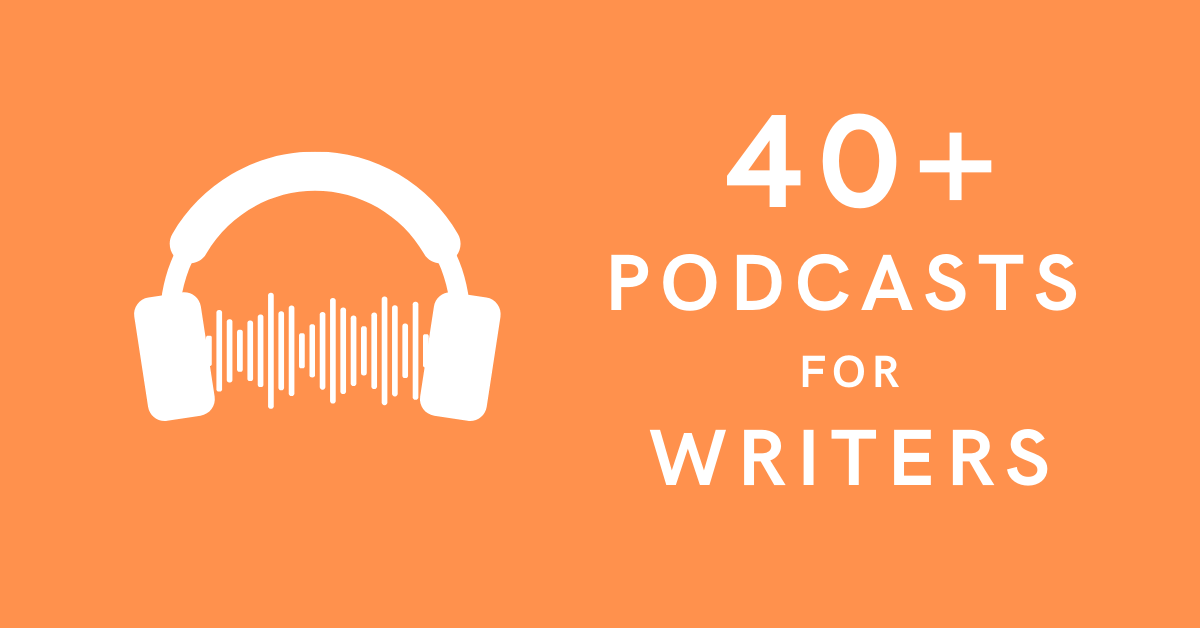 I love podcasts for writers.
I love podcasts for writers.
Why? Because I can learn about my favorite author’s writing process while I’m folding towels, and get great advice about creating characters while commuting.
Below I’ve categorized my favorite 42 podcasts for writers into five categories:
- Writing Craft
- The Business of Writing
- Revising and Editing
- Genre Podcasts
- Author Interviews
I’ve also linked some sample episodes, so you can get a sense of what the podcast is like.
Now, let’s start listening!
Writing Craft Podcasts
These podcasts are all about finding ways to generate the best creative writing possible.
1. 10 Minute Writer’s Workshop
10 Minute Writer’s Workshop is exactly what the title suggests. Host, Virginia Prescott, spends ten minutes asking well-known writers craft questions. Prescott zeros-in on a writer’s greatest strength and then probes about how they cultivated that aspect of their writing. This show includes over 60 episodes, all running around ten minutes.
Listen Here: Celeste Ng, author of Little Fires Everywhere, discusses creating compelling characters and family dynamics.
2. Helping Writers Become Authors
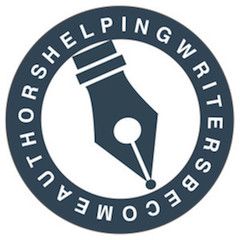 This podcast is hosted by KM Weiland and includes over 500 episodes ranging from 10-15 minutes in length. Weiland focuses heavily on craft and her author experience. This podcast is especially helpful for writers looking to enhance plot structure or bolster their creativity through lesser discussed processes such as “dreamzoning.” Each episode is scripted with clear and concise instruction, so no time is wasted on off-topic asides.
This podcast is hosted by KM Weiland and includes over 500 episodes ranging from 10-15 minutes in length. Weiland focuses heavily on craft and her author experience. This podcast is especially helpful for writers looking to enhance plot structure or bolster their creativity through lesser discussed processes such as “dreamzoning.” Each episode is scripted with clear and concise instruction, so no time is wasted on off-topic asides.
Listen Here: In this episode, Weiland discusses a generative technique that feels a lot like meditation. When Weiland is blocked, she uses dreamzoning, a process where she zones out of life and zones into her “narrative movie,” a story line existing just below the surface of her subconscious.
3. Keeping a Notebook
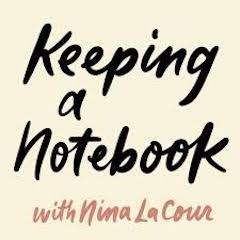 Keeping a Notebook is Nina LaCour’s podcast on crafting fiction. Keeping a Notebook includes 27 episodes, ranging from 10-20 minutes. Each episode emphasizes LaCour’s creative practice. LaCour shares passages from her writer’s notebook. She shows listeners how she plots stories on
Keeping a Notebook is Nina LaCour’s podcast on crafting fiction. Keeping a Notebook includes 27 episodes, ranging from 10-20 minutes. Each episode emphasizes LaCour’s creative practice. LaCour shares passages from her writer’s notebook. She shows listeners how she plots stories on
lengths of butcher paper. And, she demonstrates how she mines personal experiences for her fiction writing. In Keeping a Notebook, LaCour uses her own practice and teaching experience to answer listener questions about craft. LaCour answers questions like, “Should I write this as fiction or memoir?” and “How do I infuse plot into my character driven story?” or “How do I find stories to write about?”
Listen Here: In this episode, LaCour demonstrates how she used her actual experience, with what appeared to be a ghost, to inspire a fictional story.
4. Start With This 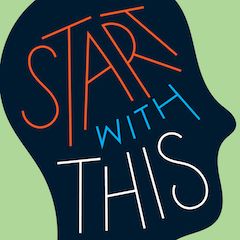 Start With This is a podcast that aims to get you writing. In each episode, Jeffrey Cranor and Joseph Fink focus on an aspect of writing process or craft. They cover a wide range of topics including plagiarism, dialogue, exposition, structure and outlining.
Start With This is a podcast that aims to get you writing. In each episode, Jeffrey Cranor and Joseph Fink focus on an aspect of writing process or craft. They cover a wide range of topics including plagiarism, dialogue, exposition, structure and outlining.
Every episode contains two assignments: something to create (usually a 200-400 word writing assignment) and something to consume (usually a reading or guest lecture). Start With This includes 51 episodes that last anywhere from three to 86 minutes.
Listen Here: Fink and Cranor discuss what constitutes a story. Is it a beginning, middle, and end? Or is it the evolution of the main character?
5. Emerging Form Emerging Form focuses on the author’s creative process. Hosts, Christie Aschwanden and Rosemerry Wahtola, interview writers and dissect their practices (Do you work during the day or night? Do you read strictly in your genre or beyond it? What practices keep you grounded and focused?)
Emerging Form focuses on the author’s creative process. Hosts, Christie Aschwanden and Rosemerry Wahtola, interview writers and dissect their practices (Do you work during the day or night? Do you read strictly in your genre or beyond it? What practices keep you grounded and focused?)
Aschwanden and Wahtola also explore how mentorship, author’s retreats, and creative communities ramp-up productivity. And then, they delve into lesser discussed practices — for instance how “crossing your art” or working in a different art form bolsters writing creativity. Emerging Form contains 34 episodes that run at about thirty minutes each.
Listen Here: Emerging Form interviews poet James Crews about cultivating creative mindfulness. The discussion explores becoming an emotional observer, being open and curious, and letting every line surprise you until the creative work emerges.
6. Writing Excuses Writing Excuses is “fifteen minutes long, because you’re in a hurry, and we’re not that smart.” Writing Excuses has fifteen seasons and an episode for almost every writing
Writing Excuses is “fifteen minutes long, because you’re in a hurry, and we’re not that smart.” Writing Excuses has fifteen seasons and an episode for almost every writing
conundrum. Interesting titles discuss deliberate discomfort as a generative technique, ensemble casts of characters, and the idea that publishers are not your friends. There are typically four hosts participating on each episode, including guest hosts, so the depth and breadth of perspective gives listeners a variety of takeaways.
Listen Here: This episode helps listeners determine when to accept feedback and when to discard it.
7. Write Now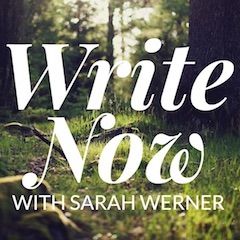 Write Now is a craft podcast hosted by Sarah Werner. Werner gets to the point quickly and presents content in an interesting way. Her tone is relatable, making listeners feel a sense of camaraderie. Interesting podcast titles include “Sarah Tries Outlining,” “Permission to Suck,” and “My Creative Process.”
Write Now is a craft podcast hosted by Sarah Werner. Werner gets to the point quickly and presents content in an interesting way. Her tone is relatable, making listeners feel a sense of camaraderie. Interesting podcast titles include “Sarah Tries Outlining,” “Permission to Suck,” and “My Creative Process.”
Werner also welcomes listener participation and comments for a more interactive experience. Write Now includes nearly 200 episodes lasting about 30 minutes each.
Listen Here: In “My 10 Biggest Writing Struggles,” Werner discusses writer’s stumbling blocks, and she provides a work around for each potential obstacle.
8. Ann Kroeker Writing Coach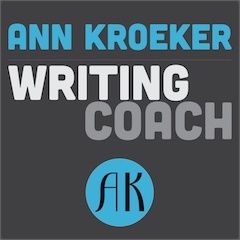 Ann Kroeker Writing Coach: In this podcast, Kroeker mentors writers to the finish line. Kroeker is a former high school composition teacher, and listeners can feel that past experience in her compassionate but authoritative tone. In under ten minutes, she gives writers tips for structuring their work, boosting their creativity, and remaining curious. Ann Kroeker Writing Coach has over 100 episodes to coach listeners through the writing process.
Ann Kroeker Writing Coach: In this podcast, Kroeker mentors writers to the finish line. Kroeker is a former high school composition teacher, and listeners can feel that past experience in her compassionate but authoritative tone. In under ten minutes, she gives writers tips for structuring their work, boosting their creativity, and remaining curious. Ann Kroeker Writing Coach has over 100 episodes to coach listeners through the writing process.
Listen Here: This episode asks, “Can a poem a day make us better writers?” Kroeker discusses how poetry can open a creative valve.
9. The Well-Storied Podcast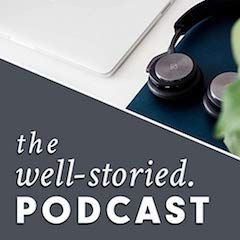 The Well-Storied Podcast is scripted, but it stays on topic. Host, Kristen Kieffer, provides a nice mix of specific craft strategies alongside ways to enhance, motivate, and inspire writers. The Well-Storied Podcast contains over 50 episodes, each running under 30 minutes.
The Well-Storied Podcast is scripted, but it stays on topic. Host, Kristen Kieffer, provides a nice mix of specific craft strategies alongside ways to enhance, motivate, and inspire writers. The Well-Storied Podcast contains over 50 episodes, each running under 30 minutes.
Listen Here: Kristen Kieffer provides “33 Ways to Write Stronger Characters.”
10. Fiction Writing Made Easy In Fiction Writing Made Easy, host Savannah Gilbo, has a mission to provide easy, step-by-step, actionable approaches to help writers sharpen their skills and craft a novel. Fiction Writing Made Easy is scripted, but swift. Episodes typically last under twenty minutes.
In Fiction Writing Made Easy, host Savannah Gilbo, has a mission to provide easy, step-by-step, actionable approaches to help writers sharpen their skills and craft a novel. Fiction Writing Made Easy is scripted, but swift. Episodes typically last under twenty minutes.
Gilbo gives clear definitions and discusses topics with illuminating specificity. She also provides relatable examples (typically from movies or widely read fiction) to tackle abstract concepts. This is a great podcast for beginning writers or writers intimidated by the prospect of creating a full-length novel. Fiction Writing Made Easy includes forty-three episodes.
Listen Here: In this episode, Gilbo defines inciting incident, gives examples of inciting incidents, and provides specific instructions for crafting inciting incidents per genre.
11. Story Makers Show  Story Makers Show is a podcast for storytellers by Elizabeth Stark and Angie Powers. I appreciate that Stark and Powers cover off-beat (but vital) topics. Interesting titles include “Time Management for Narrators,” “Lessons in Story and the Gamification of Learning,” and “Final Scene: Elizabeth Strout.” Each Story Makers Show podcast runs for 30 minutes, and there are well over 100 episodes.
Story Makers Show is a podcast for storytellers by Elizabeth Stark and Angie Powers. I appreciate that Stark and Powers cover off-beat (but vital) topics. Interesting titles include “Time Management for Narrators,” “Lessons in Story and the Gamification of Learning,” and “Final Scene: Elizabeth Strout.” Each Story Makers Show podcast runs for 30 minutes, and there are well over 100 episodes.
Listen Here: In the “Giving Notes” episode, listeners learn about critique etiquette. The show covers when it’s appropriate to give prescriptive feedback, how to work within a framework for critique, and the unspoken contract between reader and writer.
The Business of Writing
These podcasts focus on the processes for turning your writing into a money-earning operation. Each show covers topics of publicity, marketing, and publishing.
12. Track Changes
 Track Changes with Sarah Enni is an offshoot of Enni’s First Draft podcast. Track Changes has 13 episodes running about 30 minutes each. The series focuses only on the business side of books and everything “you don’t know you don’t know about publishing.”
Track Changes with Sarah Enni is an offshoot of Enni’s First Draft podcast. Track Changes has 13 episodes running about 30 minutes each. The series focuses only on the business side of books and everything “you don’t know you don’t know about publishing.”
Enni ask authors and industry experts questions about their after-the-book-was-written experience. She demystifies agents, advances, contracts, publicity, and marketing. Once you finish Track Changes, check out the remainder of First Draft which includes over 300 episodes of author interviews, book roundups, and Q and A’s.
Listen Here: In this episode, “Agents: Who They Are and How To Get One,” Enni interviews authors and agents about the process of acquiring and working with an agent. This episode includes information about how an agent-author relationship should feel and specific instructions for querying.
13. The Writers’ Co-op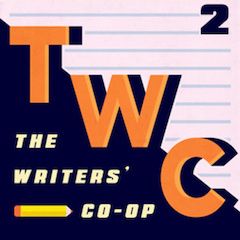 The Writers’ Co-op is a podcast for freelance writers. Jenni Gritters and Wudan Yan interview experienced freelancers and leverage their own freelancing careers to provide insight into the business. The podcast covers ways to chase late payments, the art of saying no to opportunities that aren’t quite right, and maintaining work-life balance. The podcast includes 22 episodes running at about 40 minutes in length.
The Writers’ Co-op is a podcast for freelance writers. Jenni Gritters and Wudan Yan interview experienced freelancers and leverage their own freelancing careers to provide insight into the business. The podcast covers ways to chase late payments, the art of saying no to opportunities that aren’t quite right, and maintaining work-life balance. The podcast includes 22 episodes running at about 40 minutes in length.
Listen Here: Gritters and Yan interview Matt Villano, who earns six figures per year as a freelancer. Villano breaks down the different gigs in his portfolio, talks about pitching stories, and freelancing in the high-paying corporate sector.
14. The Manuscript Academy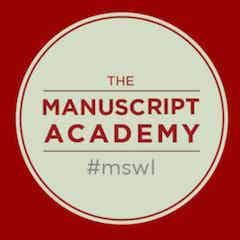 The Manuscript Academy is a podcast hosted by literary agent, Jessica Sinsheimer, and media professional, Julie Kingsley. The Manuscript Academy includes over 100 episodes to help writers through their journey to publication. Sinsheimer and Kingsley have conversations with editors, agents, and writers.
The Manuscript Academy is a podcast hosted by literary agent, Jessica Sinsheimer, and media professional, Julie Kingsley. The Manuscript Academy includes over 100 episodes to help writers through their journey to publication. Sinsheimer and Kingsley have conversations with editors, agents, and writers.
The Manuscript Academy gives insider looks into agent’s and editor’s processes. Listeners get new intel on the publishing game and build confidence to share their work with the world.
Listen Here: In this episode, “Ten Queries with Agent Cecilia Lyra,” listeners get a look into Lyra’s head. As Lyra combs her email inbox, she thinks aloud through 10 queries from prospective authors. Lyra identifies parts of the query that work, parts that don’t work, and whether she would request pages from the author or not.
15. Sell More Books Show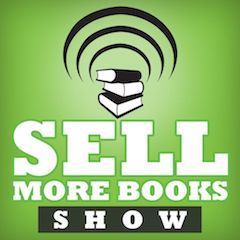 Sell More Books Show, hosted by Bryan Cohen and Claire Taylor, provides the “latest news, tips, and tactics to help you sell more books now and into the future.” Sell More Books Show includes nearly 400 episodes that consolidate book business conversations down to an hour. Each podcast is packed with different business angles including branding, the impact of book reviews, current events in the industry, social media etiquette, and publishing with indie presses.
Sell More Books Show, hosted by Bryan Cohen and Claire Taylor, provides the “latest news, tips, and tactics to help you sell more books now and into the future.” Sell More Books Show includes nearly 400 episodes that consolidate book business conversations down to an hour. Each podcast is packed with different business angles including branding, the impact of book reviews, current events in the industry, social media etiquette, and publishing with indie presses.
Listen Here: “Block Scheduling, Brand Building, and Simple Success” discusses crafting your brand. This episode also includes myths about Amazon book reviews.
16. Novel Marketing 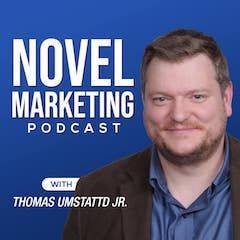 Novel Marketing is “the longest running book marketing platform in the world,” and host Thomas Umstattd, provides common sense marketing strategies for writers. Umstattd uses anecdotes and plain language to make the process of novel marketing less daunting. Umstattd also groups information into steps and easily digestible chunks so listeners are able to absorb his nearly 300 episodes worth of marketing expertise. Each episode lasts from 15-30 minutes.
Novel Marketing is “the longest running book marketing platform in the world,” and host Thomas Umstattd, provides common sense marketing strategies for writers. Umstattd uses anecdotes and plain language to make the process of novel marketing less daunting. Umstattd also groups information into steps and easily digestible chunks so listeners are able to absorb his nearly 300 episodes worth of marketing expertise. Each episode lasts from 15-30 minutes.
Listen Here: This episode discusses five simple ways to build a platform — including choosing your author name, buying your domain, reserving your url on social media, building a website, and putting your work out into the world.
17. Create If Writing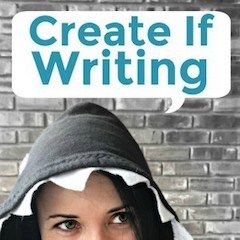 Create If Writing, hosted by Kirsten Oliphant, helps writers, bloggers, and creatives earn a living wage. Oliphant describes her successes and failures honestly so that listeners can capitalize on her experience. Oliphant discusses creating a platform, social media presence, self-publishing, creating newsletters, harnessing Amazon and Facebook ads, and troubleshooting sales. Create If has over 100 episodes lasting around 30 minutes each.
Create If Writing, hosted by Kirsten Oliphant, helps writers, bloggers, and creatives earn a living wage. Oliphant describes her successes and failures honestly so that listeners can capitalize on her experience. Oliphant discusses creating a platform, social media presence, self-publishing, creating newsletters, harnessing Amazon and Facebook ads, and troubleshooting sales. Create If has over 100 episodes lasting around 30 minutes each.
Listen Here: In “Creating an Author Newsletter,” Oliphant shows listeners how to use email to their advantage. Oliphant describes the process of mass-emailing subscribers through platforms like Mailchimp. And, did you know email can be more effective at generating book sales than social media?
Revising and Editing
These podcasts include live revision and brainstorming sessions, self-editing tips and tricks, and guidance about finding the right editor.
18. ARCHIVOS: Brainstorm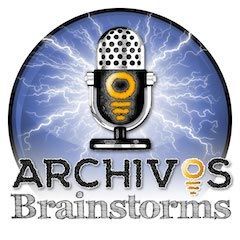 ARCHIVOS: Brainstorm is an idea workshopping podcast by Dave Robison. On Brainstorm, guest writers share their book ideas in progress, and Robison provides feedback. Guest writers read through plot points, character conflicts, and setting while Robinson provides high-level critiques.
ARCHIVOS: Brainstorm is an idea workshopping podcast by Dave Robison. On Brainstorm, guest writers share their book ideas in progress, and Robison provides feedback. Guest writers read through plot points, character conflicts, and setting while Robinson provides high-level critiques.
Robinson’s critiques point out plot holes, bumps in believability, clichés, and unnecessary fluff. As Robinson’s monster-truck-rally voice booms, creative energy ratchets, and listeners are inspired to tackle their own drafts. Brainstorm has over 120 episodes, and each episode runs for about an hour.
Listen Here: The brainstorming crew picks apart a speculative sci-fi book focusing on social media gone wrong. Together, Robison and guest host, Beth Cato, identify ways to make the book idea more marketable, cohesive, and suspenseful.
19. The Editing Podcast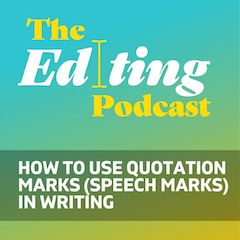 The Editing Podcast: Hosts Louise Harnby and Denise Cowle discuss all things editing. Episodes cover editing software, grammar, short-form edits, long-form edits, punctuation, and cost. The podcast is geared toward both writers and editors. Each host contributes a different scope of expertise, including business/technical editing and fiction editing. The Editing Podcast also hosts guest authors and editors. With 65 episodes, ranging from 10 minutes to an hour, listeners will find a variety of tips and tricks to tighten their work.
The Editing Podcast: Hosts Louise Harnby and Denise Cowle discuss all things editing. Episodes cover editing software, grammar, short-form edits, long-form edits, punctuation, and cost. The podcast is geared toward both writers and editors. Each host contributes a different scope of expertise, including business/technical editing and fiction editing. The Editing Podcast also hosts guest authors and editors. With 65 episodes, ranging from 10 minutes to an hour, listeners will find a variety of tips and tricks to tighten their work.
Listen Here: This episode, “10 things an Author Needs to Tell an Editor,” includes simple, but essential, questions to ensure an editor is actually enhancing your work.
20. Grammar Girl Grammar Girl, Mignon Fogarty, provides grammar tips and tricks to improve writing clarity. Fogarty also shares information about historical usage and etymology. Most of Fogarty’s podcasts consist of 10-15 minutes of easily understood information about one or two common copy errors. And with over 800 episodes, Fogarty provides enough grammar content to keep writers mechanically inclined through every line edit.
Grammar Girl, Mignon Fogarty, provides grammar tips and tricks to improve writing clarity. Fogarty also shares information about historical usage and etymology. Most of Fogarty’s podcasts consist of 10-15 minutes of easily understood information about one or two common copy errors. And with over 800 episodes, Fogarty provides enough grammar content to keep writers mechanically inclined through every line edit.
Listen Here: This episode helps writers learn how and why to avoid clichés. Fogarty also covers the interchangeability of “although” and “while.”
21. The Book Editor Show
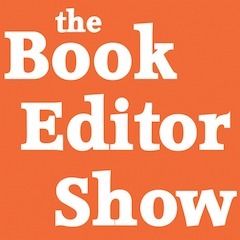 The Book Editor Show is all about editing processes. Hosts, Clark Chamberlain and Peter Turley, cover a range of editing topics, including editing subplots, proofreading tips, editing in live demonstrations, and editing strategies per genre. The Book Editor Show includes over 80 episodes with 30-60 minutes of simple editing strategies.
The Book Editor Show is all about editing processes. Hosts, Clark Chamberlain and Peter Turley, cover a range of editing topics, including editing subplots, proofreading tips, editing in live demonstrations, and editing strategies per genre. The Book Editor Show includes over 80 episodes with 30-60 minutes of simple editing strategies.
Listen Here: Chamberlain and guest host Leslie Watts help writers edit short stories for publication.
22. Death Of 1,000 Cuts
 Death Of 1,000 Cuts has 300 episodes focused on “making you a better writer one cut at a time.” Host Tim Clare’s goal is to help listeners “write more, write better, and be happier while they do it.” Death Of 1,000 Cuts accepts submissions; Clare frequently critiques listener’s first pages, structure, plot, and genre ideas.
Death Of 1,000 Cuts has 300 episodes focused on “making you a better writer one cut at a time.” Host Tim Clare’s goal is to help listeners “write more, write better, and be happier while they do it.” Death Of 1,000 Cuts accepts submissions; Clare frequently critiques listener’s first pages, structure, plot, and genre ideas.
Listen Here: In the opening episode of Clare’s “Writing a Novel” series, he critiques listener submissions.
Genre Podcasts
This category includes genre-specific shows. Genres include YA, fantasy, science fiction, personal essay, literary journalism, historical fiction, and screenplay writing.
23. Imaginary Worlds 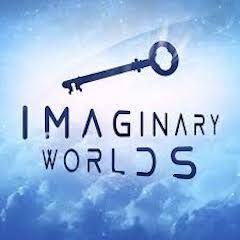 Imaginary Worlds is a podcast focused on science fiction and fantasy. Host Eric Molinsky discusses the process of (you guessed it) crafting imaginary worlds. The theme of the podcast centers on how imaginary worlds parallel our actual lives. Molinsky helps listeners determine how much reality must be infused into fantasy to maintain believability. Imaginary Worlds includes 167 episodes that run for about 30 minutes each.
Imaginary Worlds is a podcast focused on science fiction and fantasy. Host Eric Molinsky discusses the process of (you guessed it) crafting imaginary worlds. The theme of the podcast centers on how imaginary worlds parallel our actual lives. Molinsky helps listeners determine how much reality must be infused into fantasy to maintain believability. Imaginary Worlds includes 167 episodes that run for about 30 minutes each.
Listen Here: This episode asks, “Can Villains Be Good?” A pastor discusses empathy for the devil and his tendency to root for redemption. Molinsky uses this as a jumping off point to discuss fantastical villains — how much room should writers allow for a villain’s redemption?
24. Longform
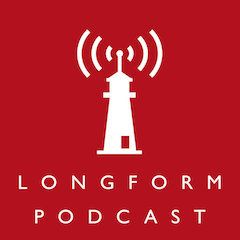 Longform includes interviews with journalists and filmmakers. Longform hosts (Aaron Lammer, Max Linsky, and Evan Ratliff) highlight how writers do their work. Longform discusses career paths, how to find interesting stories, and when and how ideas crystallize. Longform includes an array of interesting guests, and the hosts demonstrates killer interview skills. Longform has over 400 episodes, each running for about one hour.
Longform includes interviews with journalists and filmmakers. Longform hosts (Aaron Lammer, Max Linsky, and Evan Ratliff) highlight how writers do their work. Longform discusses career paths, how to find interesting stories, and when and how ideas crystallize. Longform includes an array of interesting guests, and the hosts demonstrates killer interview skills. Longform has over 400 episodes, each running for about one hour.
Listen Here: Vinson Cunningham, a staff writer for The New Yorker, discusses his career: how he became a writer, how attention is the greatest requirement for journalistic writing, and what it takes to become a critic.
25. Writing Class Radio
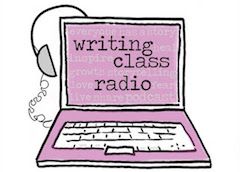 Writing Class Radio, hosted by Andrea Askowitz and Allison Langer, is a writing class turned podcast. This podcast focuses on personal essay writing. In each episode, students, listeners, and published authors provide exemplar essays for discussion.
Writing Class Radio, hosted by Andrea Askowitz and Allison Langer, is a writing class turned podcast. This podcast focuses on personal essay writing. In each episode, students, listeners, and published authors provide exemplar essays for discussion.
Each episode includes featured essayists reading their work, and this work provides topics for discussion. Writing Class Radio invites truth telling without any cheesiness or gushiness, and it is worth a listen no matter your chosen genre because all good writing hinges on some element of the truth. Writing Class Radio includes nearly 100 episodes lasting about 30 minutes each.
Listen Here: This episode focuses on “How to Write a Story While You’re Still Living It.” Camile Flosi Araujo writes about her experience living with paralysis.
26. Scriptnotes
 Scriptnotes with, John August and Craig Mazin, focuses on screenwriting. While Scriptnotes talks about writing for the screen, its discussions of story and character are applicable to any writing genre. Scriptnotes includes discussions about literary devices, do’s and don’ts of punctuation and formatting, and deliberations about good and evil characters. And, to keep readers engaged and prove his points, August often references popular movie plots. Scriptnotes includes 490 episodes, and each episode runs for about an hour.
Scriptnotes with, John August and Craig Mazin, focuses on screenwriting. While Scriptnotes talks about writing for the screen, its discussions of story and character are applicable to any writing genre. Scriptnotes includes discussions about literary devices, do’s and don’ts of punctuation and formatting, and deliberations about good and evil characters. And, to keep readers engaged and prove his points, August often references popular movie plots. Scriptnotes includes 490 episodes, and each episode runs for about an hour.
Listen Here: In this episode of Scriptnotes, August and Mazin jam about secrets and lies. This episode provides rich conversations about character motivations and suspense.
27. It’s Just Historical
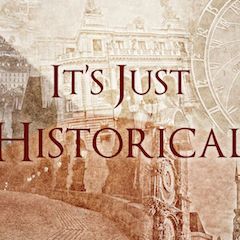 It’s Just Historical, hosted by Susanne Dunlap, has 31 episodes about writing, reading, and publishing historical fiction. Episodes run for about thirty minutes and include interviews with a variety of best-selling historical fiction novelists. Interviews shed light on research processes, the act of balancing historical fact with the fictional story, and the art of occupying settings of the past.
It’s Just Historical, hosted by Susanne Dunlap, has 31 episodes about writing, reading, and publishing historical fiction. Episodes run for about thirty minutes and include interviews with a variety of best-selling historical fiction novelists. Interviews shed light on research processes, the act of balancing historical fact with the fictional story, and the art of occupying settings of the past.
Listen Here: This episode includes an interview with Terry Lynn Thomas and discusses the writing process required for her historical mystery series.
28. Odyssey SF/F Writing Workshops Podcasts
 Odyssey SF/F Writing Workshops Podcasts: Odyssey is an intensive, summer workshop for sci-fi, fantasy, and horror writers. The podcast includes audio from the workshop’s guest lecturers. These lecturers include agents, authors, and editors. Although the workshop is geared toward genre writers, many of the lectures are brilliant craft lessons, appealing to all writers. The podcast has 135 episodes ranging from 10-20 minutes.
Odyssey SF/F Writing Workshops Podcasts: Odyssey is an intensive, summer workshop for sci-fi, fantasy, and horror writers. The podcast includes audio from the workshop’s guest lecturers. These lecturers include agents, authors, and editors. Although the workshop is geared toward genre writers, many of the lectures are brilliant craft lessons, appealing to all writers. The podcast has 135 episodes ranging from 10-20 minutes.
Listen Here: Nisi Shawl lectures on dialect and representation. Shawl delivers a lesson where students replace words in a series of sentences to demonstrate what word choice reveals about character traits and motivations.
29. The Artifexian Podcast
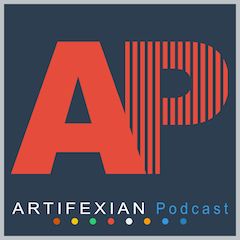 The Artifexian Podcast, hosted by Edgar Grunewald and Bill McGrath, considers world building for sci-fi-fi novels. Grunewald and McGrath discuss every aspect of creating a world — including inventing music, politics, climate, and country. Artifexian includes 70 episodes and most last over an hour.
The Artifexian Podcast, hosted by Edgar Grunewald and Bill McGrath, considers world building for sci-fi-fi novels. Grunewald and McGrath discuss every aspect of creating a world — including inventing music, politics, climate, and country. Artifexian includes 70 episodes and most last over an hour.
Listen Here: In “World building: A definition” Grunewald and McGrath talk through the basics of building a world. Listeners get a definition for world building, a discussion about the origins of world building, and exemplars and strategies to build their own worlds.
30. 88 Cups of Tea
 88 Cups of Tea with Yin Chang is all about motivating YA novelists. Topics of discussion include world building, reinventing the writing process, character development, and plotting through a series. The tone of 88 Cups of Tea is conversational and cheery; listeners feel like they are among friends.
88 Cups of Tea with Yin Chang is all about motivating YA novelists. Topics of discussion include world building, reinventing the writing process, character development, and plotting through a series. The tone of 88 Cups of Tea is conversational and cheery; listeners feel like they are among friends.
There are some asides, unrelated to writing process, but time stamped highlights help listeners access the information they want. Chang also does an excellent job interviewing authors from diverse cultural backgrounds and keeping topics timely. 88 Cups of Tea has hundreds of episodes to keep YA novelists engaged and inspired.
Listen Here: In this podcast, Natasha Ngan discusses her novel Girls of Paper and Fire — a story about what happens when two concubines of a demon king fall in love. Ngan fuses her Malaysian culture with her fantasy worlds and describes her world building process as a “pantser.”
31. WriteLane
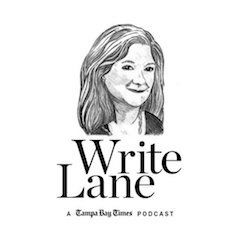 WriteLane is for narrative journalists/memoirists, and it is hosted by Pulitzer Prize-winning reporter, Lane DeGregory. In each episode, DeGregory reads excerpts from her work and shows listeners how to find stories, take notes, eavesdrop, and maintain accurate facts. While this podcast is geared toward journalists, much of DeGregory’s expertise spans genres. DeGregory’s eavesdropping segment (included in the episode below), for instance, is helpful for fiction writers hoping to sharpen their dialogue. WriteLane has 159 episodes ranging from 20-40 minutes.
WriteLane is for narrative journalists/memoirists, and it is hosted by Pulitzer Prize-winning reporter, Lane DeGregory. In each episode, DeGregory reads excerpts from her work and shows listeners how to find stories, take notes, eavesdrop, and maintain accurate facts. While this podcast is geared toward journalists, much of DeGregory’s expertise spans genres. DeGregory’s eavesdropping segment (included in the episode below), for instance, is helpful for fiction writers hoping to sharpen their dialogue. WriteLane has 159 episodes ranging from 20-40 minutes.
Listen Here: In this episode, “Finding Great Ideas, part one,” DeGregory discusses ways to find stories worth writing.
Author Interviews
These podcasts interview popular authors. Some shows specialize in commercially popular guests, while others gravitate toward literary authors.
32. Writer’s Bone
 Writer’s Bone is a literary podcast that promotes writers of all levels, backgrounds, races, and creeds. In over 400 episodes, Daniel Ford and the Writer’s Bone Crew interview writers to determine what makes them tick. Writer’s Bone also has a “Friday Morning Coffee” series that pairs author interviews with discussions about current events.
Writer’s Bone is a literary podcast that promotes writers of all levels, backgrounds, races, and creeds. In over 400 episodes, Daniel Ford and the Writer’s Bone Crew interview writers to determine what makes them tick. Writer’s Bone also has a “Friday Morning Coffee” series that pairs author interviews with discussions about current events.
Listen Here: Writer’s Bone Crew interviews Kate Hope Day about her new novel, In the Quick.
33. Otherppl
 Otherppl: Brad Listi hosts this literary podcast and interviews today’s writing leaders. Otherppl interviewees include Tim O’Brien, Roxane Gay, T Kira Madden, Bret Easton Ellis, Carmen Maria Machado, Alexander Chee, and Chuck Klosterman (and many, many more!).
Otherppl: Brad Listi hosts this literary podcast and interviews today’s writing leaders. Otherppl interviewees include Tim O’Brien, Roxane Gay, T Kira Madden, Bret Easton Ellis, Carmen Maria Machado, Alexander Chee, and Chuck Klosterman (and many, many more!).
Otherppl’s interviews are thoughtful and live. And in his interviews, Listi provides ample wait time for guests to think about their responses. This thoughtful interviewing technique results in surprising and insightful conversation riffs. Otherppl has 695 episodes that run from one to two hours.
Listen Here: Gay talks about her new story collection, Difficult Women. Listi and Gay discuss how identity informs Gay’s writing about femininity, race, the immigrant experience, and body issues.
34. How Writers Write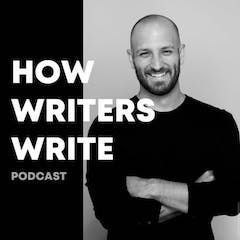 How Writers Write, by Brian Murphy, includes tips, routines, and practices from commercial fiction writers. The podcast discusses ways to connect with characters, strategies for managing plot lines, and the logistics of nailing down structure. This podcast includes over 60 episodes that run at about an hour in length.
How Writers Write, by Brian Murphy, includes tips, routines, and practices from commercial fiction writers. The podcast discusses ways to connect with characters, strategies for managing plot lines, and the logistics of nailing down structure. This podcast includes over 60 episodes that run at about an hour in length.
Listen Here: This episode includes an interview with Karen M. McManus, author of best-selling book, One of Us is Lying. McManus talks about creating character worksheets, making playlists for characters, and keeping four different plot lines straight.
35. DIY MFA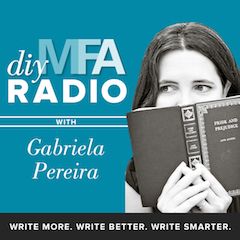 DIY MFA is an author-interview podcast hosted by Gabriela Pereira. Each podcast centers around an essential topic; these topics include how to ensure your writing is unique, balancing light and dark, and the unexpected female protagonist. Pereira also does interviews across genres, incorporating literary writers, horror writers, YA writers, and fantasy writers.
DIY MFA is an author-interview podcast hosted by Gabriela Pereira. Each podcast centers around an essential topic; these topics include how to ensure your writing is unique, balancing light and dark, and the unexpected female protagonist. Pereira also does interviews across genres, incorporating literary writers, horror writers, YA writers, and fantasy writers.
Listen Here: In this episode, New York Times best-selling author Robert Dugoni discusses a question that plagues many new writers: what if someone else steals my story?
36. Sugar Calling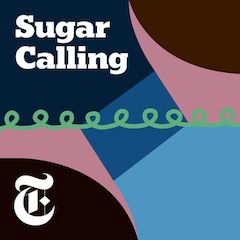 Sugar Calling is a New York Times podcast by Cheryl Strayed, author of best-selling novel, Wild and the Rumpus’s advice column, “Sugar Calling.” Strayed talks to widely successful authors including Margaret Atwood, George Saunders, and Amy Tan. Together, they discuss how to continue writing through difficult times. Many of Strayed’s conversations revolve around writing during the pandemic. But, Sugar Calling also explores writing through grief, raising teenagers, and losing one’s religion.
Sugar Calling is a New York Times podcast by Cheryl Strayed, author of best-selling novel, Wild and the Rumpus’s advice column, “Sugar Calling.” Strayed talks to widely successful authors including Margaret Atwood, George Saunders, and Amy Tan. Together, they discuss how to continue writing through difficult times. Many of Strayed’s conversations revolve around writing during the pandemic. But, Sugar Calling also explores writing through grief, raising teenagers, and losing one’s religion.
Listen Here: Strayed interviews George Saunders, and he shares wisdom about writing in the time of lockdown. Saunders shares a letter he wrote to his graduate students at Syracuse University about why it’s important to routinely write down observations, especially during unprecedented times.
37. A Mighty Blaze
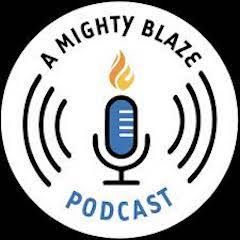 A Mighty Blaze: Host Jenna Blum interviews well known authors and asks them about their writing experience. Blum has interviewed a variety of authors including: Edwidge Danticat, John Irving, and Cheryl Strayed. Blum asks authors questions like, how do you develop ideas?
A Mighty Blaze: Host Jenna Blum interviews well known authors and asks them about their writing experience. Blum has interviewed a variety of authors including: Edwidge Danticat, John Irving, and Cheryl Strayed. Blum asks authors questions like, how do you develop ideas?
What does it feel like to get critical feedback from readers? And, what does it feel like to read your own book after it’s published? Blum also accepts questions from listeners and readers, and in this way, she helps connect readers to their favorite authors.
Listen Here: Author Edwidge Danticat discusses her writing process and what it’s like to be an author of color living and working in America.
38. Beyond the Page: The Best of the Sun Valley Writers’ Conference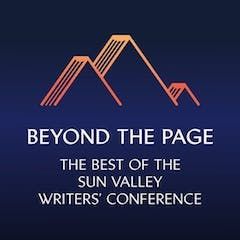 Beyond the Page: The Best of the Sun Valley Writers’ Conference: Go to a writer’s conference without actually going to the conference. All of the best experiences of the conference are curated for you, so you can listen on your couch in your sweat pants or in your car on your morning commute.
Beyond the Page: The Best of the Sun Valley Writers’ Conference: Go to a writer’s conference without actually going to the conference. All of the best experiences of the conference are curated for you, so you can listen on your couch in your sweat pants or in your car on your morning commute.
Beyond the Page includes literary writing’s “brightest stars” including Roger McNamee, Min Jin Lee, and David Grossman. This podcast has more of a public-speaker-delivers-a-speech vibe rather than a conversation-among-hosts format. But, the polished content is worth a listen. Beyond the Page includes 19 episodes ranging from 20-40 minutes.
Listen Here: Pulitzer Prize winner Anthony Doerr discusses failure. Doerr voices a hilarious monologue while he attempts to revise a particularly troublesome paragraph.
39. The Literary Life with Mitchell Kaplan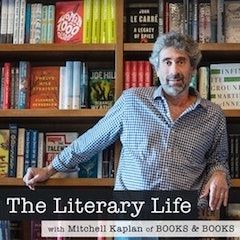 Kaplan, a book seller and indie book store owner, talks with literary writers about practices and inspiration. Kaplan’s voice is somewhat reminiscent of the teacher from Ferris Bueller’s Day Off, but he’s not boring; he asks great probing questions to help listeners identify what makes a successful book and what makes a successful writing process.
Kaplan, a book seller and indie book store owner, talks with literary writers about practices and inspiration. Kaplan’s voice is somewhat reminiscent of the teacher from Ferris Bueller’s Day Off, but he’s not boring; he asks great probing questions to help listeners identify what makes a successful book and what makes a successful writing process.
The podcast includes over 100 episodes, most ranging from 30-50 minutes.
Listen Here: Kaplan and Dantiel W. Moniz talk about developing her new book Milk Blood Heat.
40. fiction/non/fiction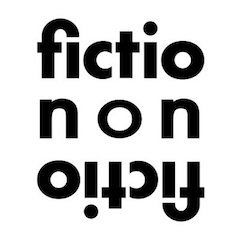 Hosts Whitney Terrell and V.V. Ganeshananthan “interpret current events through the lens of literature.” In its 92 episodes fiction/non/fiction features essayists, journalists, novelists, and poets. The premise of the podcast is that any story featured on the news has, in some way, already been written in literature.
Hosts Whitney Terrell and V.V. Ganeshananthan “interpret current events through the lens of literature.” In its 92 episodes fiction/non/fiction features essayists, journalists, novelists, and poets. The premise of the podcast is that any story featured on the news has, in some way, already been written in literature.
The format of the podcast begs the question — do writers inspire the world, or does the world inspire writers? Authors typically read a passage or short work that they’ve published, and then the hosts pose questions regarding inspiration, mindset, and research that led to the authoring of said passage. This discussion is then juxtaposed with related current events.
Listen Here: The hosts and Jenny Offill discuss conspiracy theories, the storming of the U.S. Capitol, and Offill’s novel Weather. James Plath also weighs in with his critical essays regarding conspiracy.
41. Magic Lessons with Elizabeth Gilbert Gilbert, author of Eat Pray Love, hosts an interactive podcast that features artists at both the amateur and expert level. Gilbert’s podcast has an empathetic, almost therapeutic tone, as she helps novice writers grapple with rejection, failure, imposter syndrome and writer’s block.
Gilbert, author of Eat Pray Love, hosts an interactive podcast that features artists at both the amateur and expert level. Gilbert’s podcast has an empathetic, almost therapeutic tone, as she helps novice writers grapple with rejection, failure, imposter syndrome and writer’s block.
Each amateur segment is paired with an expert segment, providing a sort of mentor track for newbies. Gilbert also provides homework for each novice artist, allowing them a path up and out of their current block. Magic Lessons has 22 episodes ranging from twenty minutes to over an hour.
Listen Here: In this episode, Gilbert chats with a poet from Florida who has been rejected by 12 MFA programs. Gilbert, the MFA candidate, and author Mark Nepo work through the question: “Who gets to decide whether you’re a legitimate artist?”
42. Writer, Writer, Pants on Fire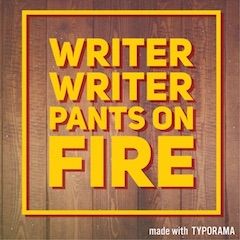 Writer, Writer, Pants on Fire, hosted by Mindy McGinnis, offers a little bit of everything – craft, agent hunting, query advice, and industry information. McGinnis manages to find off-beat, fresh subject matter experts to supply interviews for over 160 episodes. Some episodes are under ten minutes, some are over an hour, but all deliver a slice of inspiration.
Writer, Writer, Pants on Fire, hosted by Mindy McGinnis, offers a little bit of everything – craft, agent hunting, query advice, and industry information. McGinnis manages to find off-beat, fresh subject matter experts to supply interviews for over 160 episodes. Some episodes are under ten minutes, some are over an hour, but all deliver a slice of inspiration.
Listen Here: McGinnis talks with Pictionary inventor Rob Angel to gain writing inspiration.


2 comments
This is a great post, thanks for sharing. I’d love it if you could consider my podcast for an update version, should you do one. I have a podcast called ‘Write Enjoy Repeat’ where I talk to every day people who love to write about what it is they get out of writing, why you should try it etc. My aim is to inspire people to pick up a pen. Hope it’s OK to share this here. Cheers! Claire
Thanks for including the Fiction Writing Made Easy podcast! You have a really great round up here. I’m excited to have some other shows to check out 🙂